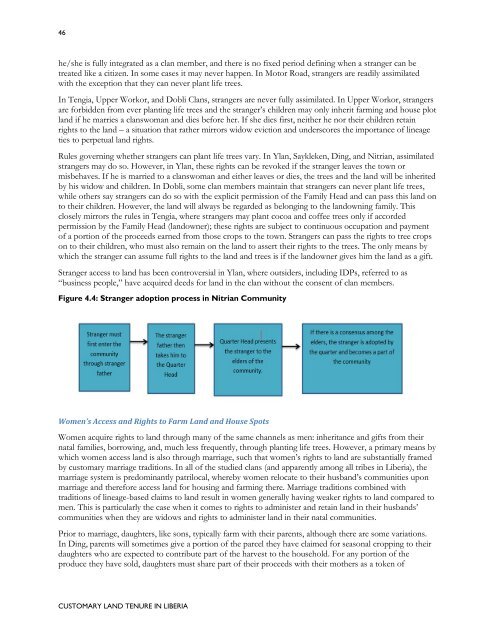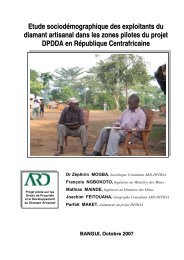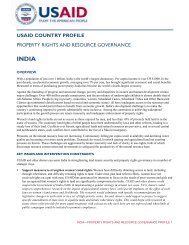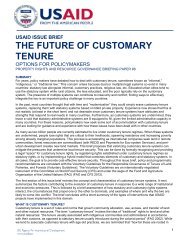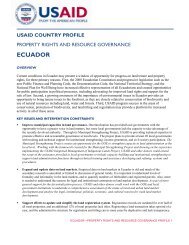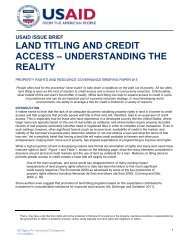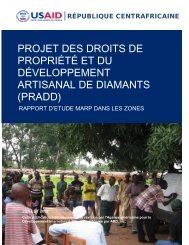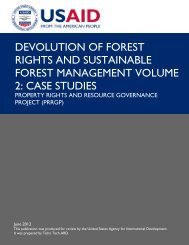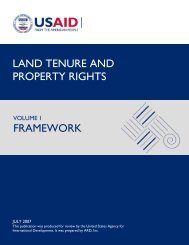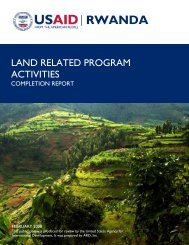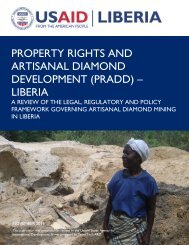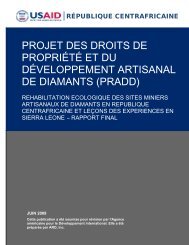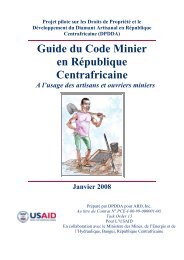Customary Land Tenure in Liberia - Land Tenure and Property ...
Customary Land Tenure in Liberia - Land Tenure and Property ...
Customary Land Tenure in Liberia - Land Tenure and Property ...
You also want an ePaper? Increase the reach of your titles
YUMPU automatically turns print PDFs into web optimized ePapers that Google loves.
46<br />
he/she is fully <strong>in</strong>tegrated as a clan member, <strong>and</strong> there is no fixed period def<strong>in</strong><strong>in</strong>g when a stranger can be<br />
treated like a citizen. In some cases it may never happen. In Motor Road, strangers are readily assimilated<br />
with the exception that they can never plant life trees.<br />
In Tengia, Upper Workor, <strong>and</strong> Dobli Clans, strangers are never fully assimilated. In Upper Workor, strangers<br />
are forbidden from ever plant<strong>in</strong>g life trees <strong>and</strong> the stranger‟s children may only <strong>in</strong>herit farm<strong>in</strong>g <strong>and</strong> house plot<br />
l<strong>and</strong> if he marries a clanswoman <strong>and</strong> dies before her. If she dies first, neither he nor their children reta<strong>in</strong><br />
rights to the l<strong>and</strong> – a situation that rather mirrors widow eviction <strong>and</strong> underscores the importance of l<strong>in</strong>eage<br />
ties to perpetual l<strong>and</strong> rights.<br />
Rules govern<strong>in</strong>g whether strangers can plant life trees vary. In Ylan, Saykleken, D<strong>in</strong>g, <strong>and</strong> Nitrian, assimilated<br />
strangers may do so. However, <strong>in</strong> Ylan, these rights can be revoked if the stranger leaves the town or<br />
misbehaves. If he is married to a clanswoman <strong>and</strong> either leaves or dies, the trees <strong>and</strong> the l<strong>and</strong> will be <strong>in</strong>herited<br />
by his widow <strong>and</strong> children. In Dobli, some clan members ma<strong>in</strong>ta<strong>in</strong> that strangers can never plant life trees,<br />
while others say strangers can do so with the explicit permission of the Family Head <strong>and</strong> can pass this l<strong>and</strong> on<br />
to their children. However, the l<strong>and</strong> will always be regarded as belong<strong>in</strong>g to the l<strong>and</strong>own<strong>in</strong>g family. This<br />
closely mirrors the rules <strong>in</strong> Tengia, where strangers may plant cocoa <strong>and</strong> coffee trees only if accorded<br />
permission by the Family Head (l<strong>and</strong>owner); these rights are subject to cont<strong>in</strong>uous occupation <strong>and</strong> payment<br />
of a portion of the proceeds earned from those crops to the town. Strangers can pass the rights to tree crops<br />
on to their children, who must also rema<strong>in</strong> on the l<strong>and</strong> to assert their rights to the trees. The only means by<br />
which the stranger can assume full rights to the l<strong>and</strong> <strong>and</strong> trees is if the l<strong>and</strong>owner gives him the l<strong>and</strong> as a gift.<br />
Stranger access to l<strong>and</strong> has been controversial <strong>in</strong> Ylan, where outsiders, <strong>in</strong>clud<strong>in</strong>g IDPs, referred to as<br />
“bus<strong>in</strong>ess people,” have acquired deeds for l<strong>and</strong> <strong>in</strong> the clan without the consent of clan members.<br />
Figure 4.4: Stranger adoption process <strong>in</strong> Nitrian Community<br />
Women’s Access <strong>and</strong> Rights to Farm <strong>L<strong>and</strong></strong> <strong>and</strong> House Spots<br />
Women acquire rights to l<strong>and</strong> through many of the same channels as men: <strong>in</strong>heritance <strong>and</strong> gifts from their<br />
natal families, borrow<strong>in</strong>g, <strong>and</strong>, much less frequently, through plant<strong>in</strong>g life trees. However, a primary means by<br />
which women access l<strong>and</strong> is also through marriage, such that women‟s rights to l<strong>and</strong> are substantially framed<br />
by customary marriage traditions. In all of the studied clans (<strong>and</strong> apparently among all tribes <strong>in</strong> <strong>Liberia</strong>), the<br />
marriage system is predom<strong>in</strong>antly patrilocal, whereby women relocate to their husb<strong>and</strong>‟s communities upon<br />
marriage <strong>and</strong> therefore access l<strong>and</strong> for hous<strong>in</strong>g <strong>and</strong> farm<strong>in</strong>g there. Marriage traditions comb<strong>in</strong>ed with<br />
traditions of l<strong>in</strong>eage-based claims to l<strong>and</strong> result <strong>in</strong> women generally hav<strong>in</strong>g weaker rights to l<strong>and</strong> compared to<br />
men. This is particularly the case when it comes to rights to adm<strong>in</strong>ister <strong>and</strong> reta<strong>in</strong> l<strong>and</strong> <strong>in</strong> their husb<strong>and</strong>s‟<br />
communities when they are widows <strong>and</strong> rights to adm<strong>in</strong>ister l<strong>and</strong> <strong>in</strong> their natal communities.<br />
Prior to marriage, daughters, like sons, typically farm with their parents, although there are some variations.<br />
In D<strong>in</strong>g, parents will sometimes give a portion of the parcel they have claimed for seasonal cropp<strong>in</strong>g to their<br />
daughters who are expected to contribute part of the harvest to the household. For any portion of the<br />
produce they have sold, daughters must share part of their proceeds with their mothers as a token of<br />
CUSTOMARY LAND TENURE IN LIBERIA


